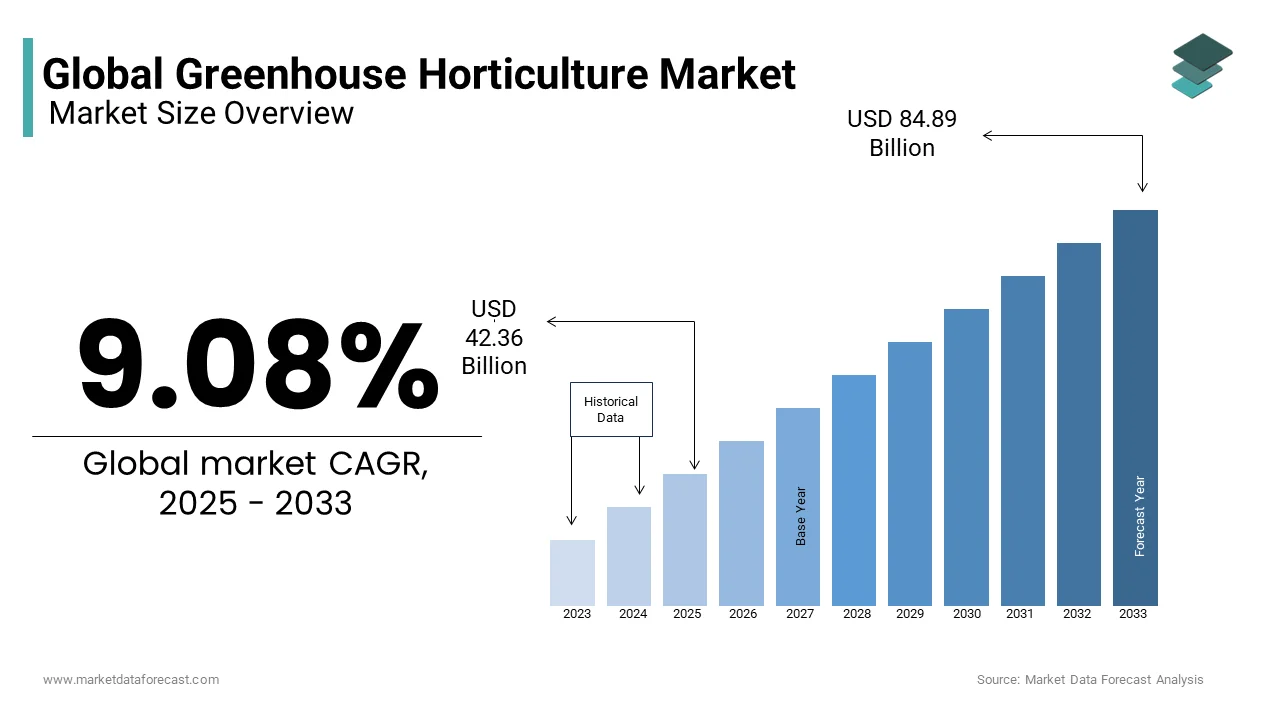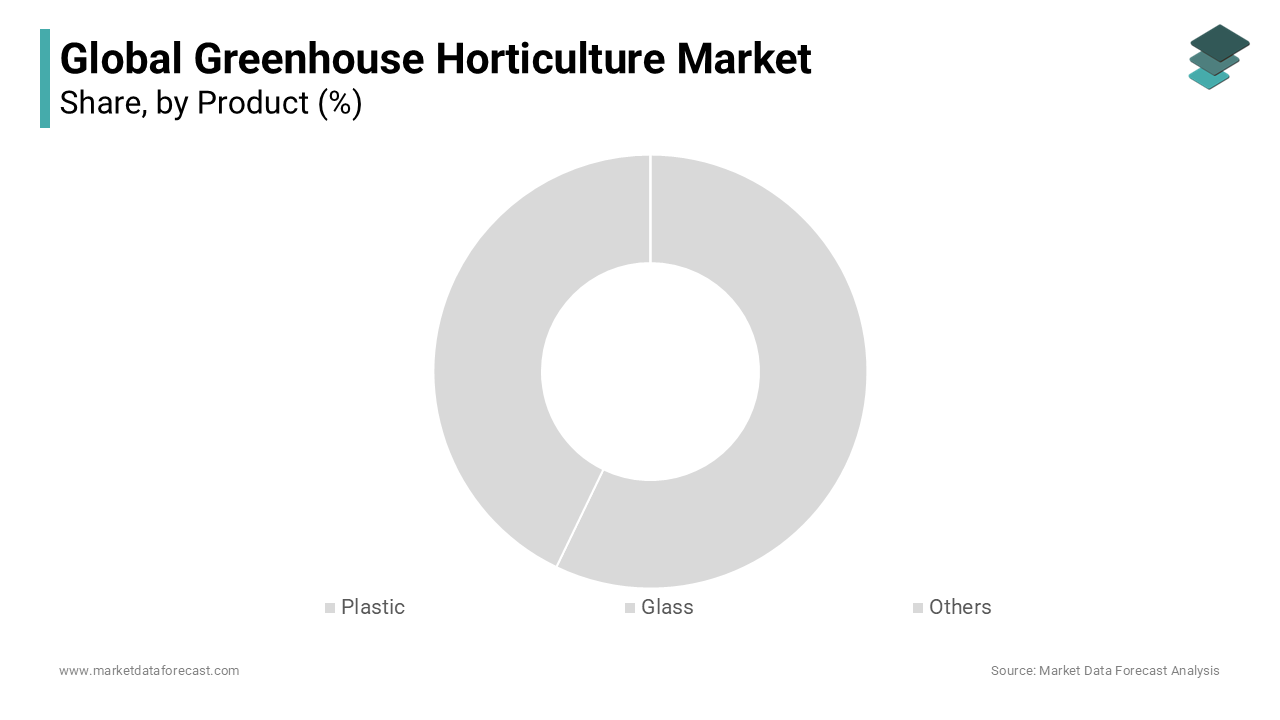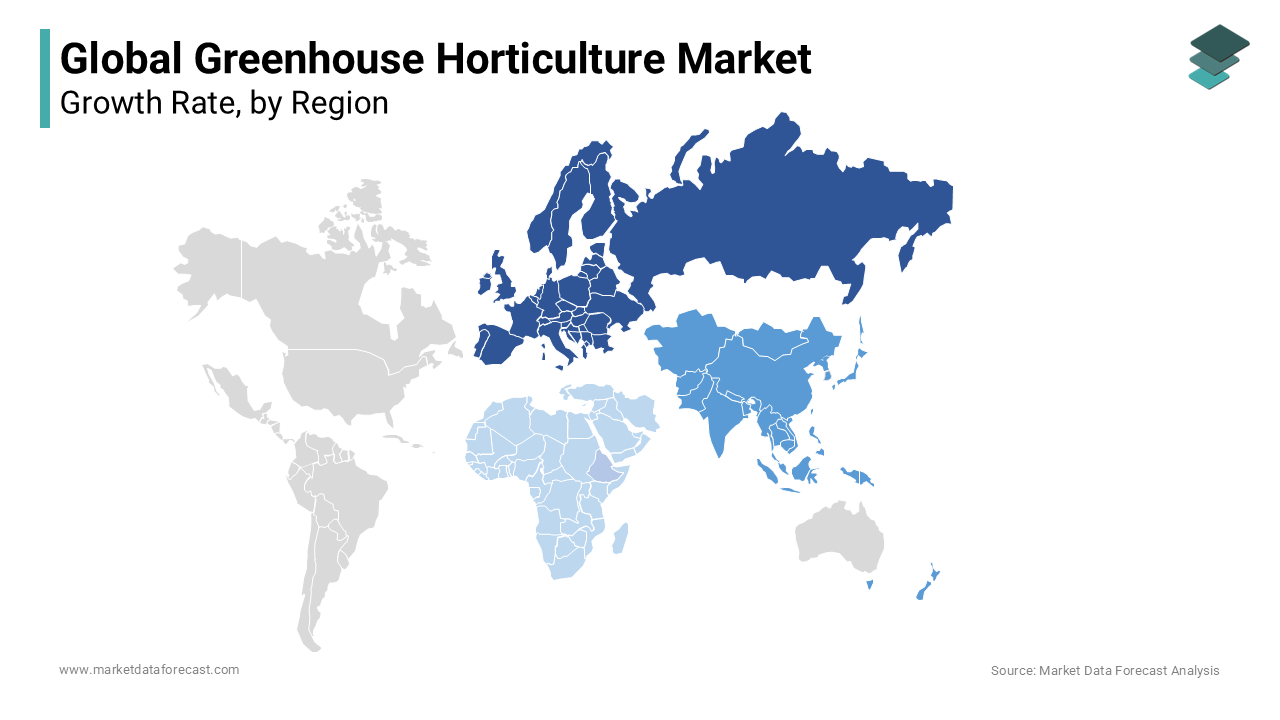Global Greenhouse Horticulture Market Size, Share, Trends & Growth Forecast Report Segmented By Covering Material (Plastic Greenhouses and Glass Greenhouses), Product (Ornamentals and Edibles), Application (Greenhouse Films, Grow Bags, Wind Break and Shelter Nets, Horticulture Twines and Others) and Region (North America, Europe, Asia Pacific, Latin America, and Middle East & Africa), Industry Analysis (2025 to 2033)
Global Greenhouse Horticulture Market Size
The global greenhouse horticulture market was valued at USD 38.83 billion in 2024 and is anticipated to reach USD 42.36 billion in 2025 from USD 84.89 billion by 2033, growing at a CAGR of 9.08% from 2025 to 2033.

Produce crops in an organized shelter to deliver customized provisions for growing crops that were built using transparent materials such as glass, plastic, and other materials such as polyvinyl chloride, polycarbonate rigid plastic acrylic, and others. The greenhouse can control external parameters such as light, temperature, humidity, and carbon dioxide emissions. The market value is expected to increase more during the forecast period due to the surge in demand for protected crop cultivation across the globe, along with the rising need for extending the cropping season to feed the growing population and protect them from climatic conditions and pests.
MARKET DRIVERS
The growing need to extend the cropping season in order to feed the growing population and protect them from adverse climatic conditions and pests is propelling the greenhouse horticulture market growth. Improvements in CO2 extraction technologies for greenhouses and increased urban demand for horticultural production are some of the driving factors of the greenhouse horticulture market. The rising adoption of greenhouse farming techniques and the growing demand for food due to the increasing population in some emerging countries such as China and India are also driving factors in the worldwide greenhouse horticulture market. The growing demand for protected crop cultivation across the globe and rising awareness by various governments and other associations in research and development for the new technological advancements in the field propels the growth of the global greenhouse horticulture market.
In the global greenhouse horticulture market, the market participants are predicted to have a favorable market environment during the forecast period owing to the surge in demand for protected crop cultivation across the globe and increasing investments by organizations for the innovations of technological advancements. Furthermore, the rising adoption of greenhouse farming techniques and the increasing call for food due to the rising population in some emerging countries such as China and India have helped the greenhouse horticulture market to grow further during the outlook period. The greenhouse horticulture market is moving forward because of increasing food insecurity and the green energy transition caused by geo-economic fragmentation. The Ukraine-Russia war shredded key commodity industries. This encouraged farmers and companies worldwide, particularly in North America and Europe, to adopt protected cropping. Market fragmentation was biggest in agriculture, followed by minerals and then by the energy sector.
The growing need to extend the cropping season to feed the rising population and the increased frequency of adverse climatic conditions and pests is propelling the greenhouse horticulture market growth. For instance, the Indian government is seriously considering the formation of the “‘India Digital Ecosystem of Agriculture” (IDEA) framework. This structure will function as the blueprint for the affiliated cultivator’s database called AgriStack. Also, this witnessed the rise of remote sensing technology as an important tool to achieve this goal. Advancements in CO2 extraction technologies for greenhouses and expanding urban demand for horticultural production are also the driving factors of the market. Moreover, the rising demand for protected crop cultivation across the globe and increased efforts by several governments and other associations in research and development for the new technological advancements in the field propels the expansion of the greenhouse horticulture market.
Furthermore, it is looked at as a steady source of fresh yield with no disruptions from climate-related events. So, the rising adoption of greenhouse farming techniques and the increasing call for food due to the growing population density in some emerging countries such as China and India have helped the greenhouse horticulture market to grow further during the outlook period.
MARKET RESTRAINTS
Strict regulations from the government authorities are one of the major restraints affecting the growth of the greenhouse horticulture market. Another major limitation to the expansion of the greenhouse horticulture market is the shortage of cold storage facilities, along with the high soluble salts in agricultural water. Strict regulations from the government authorities are one of the major restraints affecting the growth of the greenhouse horticulture market. Another major limitation to the expansion of the market is the shortage of cold storage facilities, along with the high soluble salts in agricultural water. Further, issues regarding the intensity and spectrum of light that LEDs give out are also hindering the industry's progress. Moreover, due to market volatility and high interest and inflation rates, a rise in bankruptcy filings was noticed in 2023, decreasing the market growth rate. For instance, in January 2023, a greenhouse cultivator from Leamington, Ontario (Canada) named Lakeside Produce filed for bankruptcy. In the following month, April of the same year, in the United States, multiple filings were registered in Orlando (Florida), New Jersey, Kentucky, Detroit, etc., by vertical farming companies, including Kalera, AeroFarms, Planted Detroit and AppHarvest, an indoor grower in July.
Additionally, the challenge of cost control owing to elevated prices for inputs, fuel, and labor continues to obstruct the way forward for the industry players. Vendors across the regions experienced a surge in costs from corrugate to film to trays and logistics and some areas even saw a double-digit rise in prices. Besides this, waste management and water usage are other factors impacting the market.
REPORT COVERAGE
|
REPORT METRIC |
DETAILS |
|
Market Size Available |
2024 to 2033 |
|
Base Year |
2024 |
|
Forecast Period |
2025 to 2033 |
|
CAGR |
9.08% |
|
Segments Covered |
By Covering Material, Application, Product and Region |
|
Various Analyses Covered |
Global, Regional, & Country Level Analysis; Segment-Level Analysis, DROC, PESTLE Analysis, Porter’s Five Forces Analysis, Competitive Landscape, Analyst Overview of Investment Opportunities |
|
Regions Covered |
North America, Europe, APAC, Latin America, Middle East & Africa |
|
Market Leaders Profiled |
Richel Group, Hoogendoorn Growth Management B V, Certhon Inc, Dalsem Horticulture Projects B V, HortiMaX B V, Harnois Greenhouses, Priva B V, Ceres Greenhouse Solutions |
SEGMENT ANALYSIS
By Product Insights

REGIONAL ANALYSIS

Among these regions, Europe holds the major share of the greenhouse horticulture market owing to the high adoption of this technique in crop production. Also, unfavorable weather conditions in some countries, such as the UK, Germany, and France, propel the revenue rate growth in the European region. Asia Pacific region holds the second-largest share of the greenhouse horticulture market due to the rising adoption of greenhouse farming techniques and the rising need for food due to the mounting population in countries such as China and India in this area.
Europe holds the major share of the greenhouse horticulture market owing to the high adoption of this technique in crop production. Also, unfavorable weather conditions in some countries, such as the Netherlands, Spain, the UK, Italy, Germany, and France, propel the revenue rate growth in the European region. Likewise, the continent is heating more rapidly than the world average. The annual average temperature over the region’s territorial areas in the recent decade was 2.12 to 2.19°C, warmer than during the pre-industrial age. Also, 2023 was the second hottest year in Europe since instrumental registers started, as per all datasets utilized. This led to a greater demand for controlled environment agriculture (CEA) to fulfill provincial food and veggie needs. Additionally, the regional market share is increasing owing to the use of 5G technology. For instance, In the Netherlands, TomatoWorld in Honselersdijk is utilizing 5G technology for testing greenhouse facilities.
Asia Pacific region holds the second-largest share of the greenhouse horticulture market due to the rising adoption of sustainable farming techniques and the rising need for food because of the mounting population in countries such as China and India in this area. Moreover, the APAC industry is expanding at a fast rate. Also, increased collaboration with specialist companies in the area and proficient and high-technology nurseries have been established in the last few years for extensive farming of ornamental plant and vegetable products. Apart from this, in South Korea, alternate energy sources, water recycling, etc., have gained more focus recently, so the country’s horticulture has moved forward towards sustainability and higher production. They are farming in semi-closed greenhouses, improving weather control, and applying AI and big data, all of which are boosting the market size.
North America is expected to expand at a promising CAGR during the forecast period owing to a surge in demand for protected crop cultivation in some countries such as the U.S., Mexico, and Canada. In addition, Canada’s industry is a breeding ground for expansion. Greenhouses differentiating in vegetables and fruits in the country have surged in farm gate amount for the 11th successive year, raising 9.2% to 2.5 billion dollars in 2023, which doubled in size from 10 years ago. Its greenhouse vegetables make up 39% of fresh food exports, and almost all are sent to the US, i.e., 99.5%. However, its infrastructure constraints could derail the growth in the future. Furthermore, in June 2024, Hort Americas reported a special collaboration with Meteor Systems to spread their HDPE floating rafts in the North American region to improve the sustainability and effectiveness of horticulture customs.
Latin America presents a lucrative opportunity for the greenhouse horticulture market. It is strategically located to solve world food scarcity, providing three crucial ingredients: a large production capacity, a robust labor source, and an unbiased geopolitical place. Moreover, Brazil is one of the world's biggest greenhouse cultivators. Presently, there are about 6000 greenhouses in application, and a forecasted 1.5 million metric tons of tomatoes and other fruits and vegetables are grown yearly in Brazil.
The Middle East and Africa are expected to grow at a higher CAGR during the estimation period for the greenhouse horticulture market. For instance, in 2023, various projects were revealed in the Middle East, like Saudi Arabia's Public Investment Fund's joint venture arrangement with AeroFarms (A US-based company), Mowreq's partnership with YesHealth, and in Riyadh, the formation of the Bather Smart Farm which is 2500 sq.m.
KEY MARKET PLAYERS
Some of the key players in the global greenhouse horticulture market include Richel Group, Hoogendoorn Growth Management B V, Certhon Inc, Dalsem Horticulture Projects B V, HortiMaX B V, Harnois Greenhouses, Priva B V, Ceres Greenhouse Solutions, Van Der Hoeven, Oritech Solutions, Netafim Ltd, Ridder Holding Harderwijk B V, Rough Brothers Inc, Top Greenhouses Ltd and others. Most companies explore new regions by innovating new products, collaborating with other companies, and acquisitions across the globe to increase the demand in the market and to improve the revenue of their company.
RECENT DEVELOPMENTS IN THIS MARKET
- In May 2024, Sollum Technologies press released the signing of a new strategic collaboration with Damatex for transforming greenhouse management. This partnership brings together Sollum's greenhouse lighting control characteristics of SUN as a Service cloud platform with Damastex’s modern weather control systems.
- In February 2024, Enza Zaden reported the purchase of Balk Wervershoof B.V. (Balk Wervershoof), a GSPP-certified greenhouse horticulture company. It has been manufacturing cucumber, sweet potato, and tomato pepper seeds exclusively for Enza Zaden for the last sixty years.
MARKET SEGMENTATION
This research report on the global greenhouse horticulture market has been segmented and sub-segmented based on covering material, application, product, and region.
By Covering Material
- Plastic
- Glass
By Application
- Greenhouse Films
- Grow Bags
- Windbreak
- Shelter Nets
- Horticulture Twines
- Others
By Product
- Ornamentals
- Edibles
By Region
- North America
- Europe
- Asia Pacific
- Latin America
- Middle East and Africa
Related Reports
Access the study in MULTIPLE FORMATS
Purchase options starting from $ 2500
Didn’t find what you’re looking for?
TALK TO OUR ANALYST TEAM
Need something within your budget?
NO WORRIES! WE GOT YOU COVERED!
Call us on: +1 888 702 9696 (U.S Toll Free)
Write to us: [email protected]